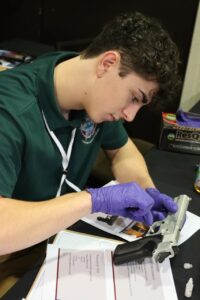Four Washington County Community College Criminal Justice Students Attend New England Division of the International Association of Identification Conference
 Four Criminal Justice students from Washington County Community College were chosen to attend the 28th Annual NEDIAI, or the New England Division of the International Association of Identification.
Four Criminal Justice students from Washington County Community College were chosen to attend the 28th Annual NEDIAI, or the New England Division of the International Association of Identification.
Taylor LeBlanc, Rose Adams, Mackenzie Hewitt, and Connor Cook were chosen by Criminal Justice and Conservation Law Instructor, Wayde Carter, and Jason Fowler of the Maine State Police and adjunct professor at WCCC. The two came together to choose these four students based on their academic performance and professionalism.
From Sunday, December 4th to the 7th, students gathered at the Courtyard Boston Marlborough in Marlborough, Massachusetts to participate in and learn from lectures and workshops with local, state, and federal investigators.
Some of the subjects of these workshops were Crime Scene Photography, Latent Print Analysis, Footwear Comparison, Impressions Photography, Ten Prints Comparison, Bloody Crime Scene, Low Light Photography, Police Composite Drawing, and Introduction to Crime Scene Processing.
“They were able to sit in on high profile case reviews such as the forensic review of the Boston Marathon Bombing with Massachusetts State Police, Golden State Killer Cold Case with FBI, Lisa Ziegert Cold Case with Massachusetts State Police, Marshfield Mass Homicide case review, Reginald Sanford Homicide case review, and Jassy Correia Homicide with FBI Boston and Boston PD,” mentioned Carter.
Each student received a training certificate for Introduction to Crime Scene Processing and were able to train alongside investigators from Massachusetts State Police and Boston Police Department.
“Our students were praised for their professionalism and entry-level knowledge of criminal justice. This was an awesome opportunity for the selected students to participate with seasoned investigators and witness the need for educated and well-trained criminal justice personnel to carry on the works of those currently in the field. The conference gave them a broad view of how many moving parts there are in an investigation and the science in the field that ultimately clears or convicts a person of a crime,” said Carter.



